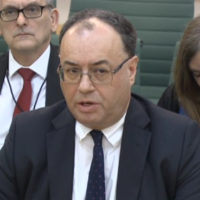
Bailey argued that all he could now do about the problem was “get the megaphone out”.
Citing the mortgage prisoners situation as a key example, Bailey told the Treasury Select Committee (TSC) that government “on the whole isn’t keen” on changing the regulator’s perimeter.
Bailey noted that Brexit had made it a period where it was “pretty difficult to get legislative change” and that it should be easier to make the case for changing the perimeter.
“I’ve said a number of times, I’ve advocated that the only way we can conclusively address this question is to change the perimeter, it hasn’t happened,” he told the committee.
“We can analyse why it hasn’t happened, but today we are still in the same place. What we’ve done, is to say how can we work around that because it’s not happening? What can we do to address these problems without getting a change in the perimeter?”
He continued: “I’ve spent a lot of time on this to see what we can do. One of my conclusions is we get the megaphone out frankly.
“It’s not a satisfactory solution on its own, it maybe the thing that we do and I’m happy to do it, but ultimately we should be changing the perimeter.”
‘Things that should not happen’
During a grilling by the Treasury Select Committee over his appointment as Bank of England governor, Bailey also defended his record as boss of the regulator but admitted that “things happened that should not happen”.
Bailey committed to writing to the TSC to address concerns raised by the True and Fair report last week which prompted senior politicians from across the House of Commons to question his appointment.
He argued that the FCA was originally formed to tackle issues from large firms, but it had been forced to reinvent itself to deal with a majority of smaller firms and the risks they brought.
And he said the organisation had been far more pro-active in tackling financial crime such as insider trading and money laundering.
Bailey added that the so-called pensions freedoms were “introduced too quickly” forcing the regulator to play catch-up, but that 370 firms had since left the space after being confronted about the quality of their advice and there was a large investigation still in progress.
He also noted that he had not realised the importance of the FCA register when he joined and that the regulator was now placing greater resources in that and would be releasing a new version later this month.















